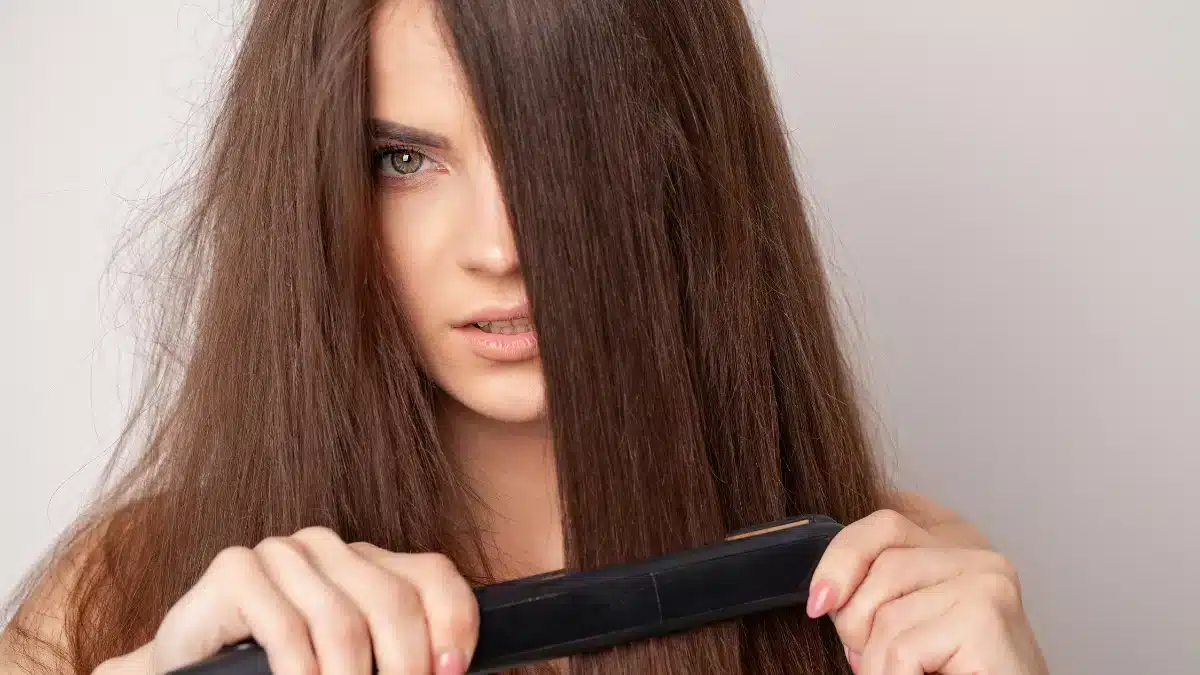Why Does My Hair Smell Burnt: Unraveling the Burnt Hair Enigma
Have you ever been styling your hair with a heat-styling tool and suddenly noticed a burning smell?
Don’t worry; it’s common. But not only this, you may sometimes notice that your hair smells weird, like a burnt straw, even when you are not using any heat-styling tools.
This can make you question why your hair smells burnt out of nowhere.
There can be different reasons for the burning smell of your hair.
Continue reading to know some potential answers for why your hair smells burnt.
Heat damage
Heat damage is one of the most common causes of your hair smelling burnt.
We all know when some kind of heat is applied; for example, when ironing your clothes at a higher temperature than required, there’s a burning smell.
The same happens when you apply heat to your hair with different styling tools and products.
The familiar sources of heat-styling products are:
- Flat irons
- Curling irons
- Blow dryers
- Crimpers
You may start noticing the burning smell when there’s a modification in your hair shaft due to moisture loss.
When heat is applied to hair, and the moisture gets out, it may produce a burnt smell.
A study was conducted in which the influence of increasing temperature from 20 to 200°C on hair was studied.
It was reported that the hair structure was degraded at around 200 °C after the elimination of bound water.
Moreover, an overuse or incorrect usage of heat styling tools, especially without proper heat protectant products, may increase the burnt smell.
Chemical treatments

Most of your hair is composed of Keratin, a protein that makes up about 90% of its structure.
Additionally, a significant portion of your hair contains Sulfur.
Sulfur is known for producing unpleasant odors when combined with other compounds.
When your hair undergoes chemical treatments, it causes the breakdown of certain protein bonds containing Sulfur.
When this chemical is released from your hair and mixed with the surrounding air, it may produce a burnt smell.
Buildup from hair products

When it comes to the burnt smell of hair due to buildup from hair products, the explanation lies in the combination of product residues and heat exposure.
It is similar to when you burn any substance, and it releases an odor due to the chemical reaction.
Over time, if you consistently use hair styling products like hairspray, mousse, gels, or waxes without proper cleansing, they can accumulate on your hair strands and scalp.
This buildup creates a layer of residue that may not be visible to the naked eye.
When you apply heat to your hair, such as using flat irons or curling irons, the high temperatures can also cause the product residues to heat up.
As a result, the combination of heat and the chemical components in these products can lead to a burning reaction.
This burning reaction between the heat and the product residues can cause a distinct burnt smell.
Environmental factors
Sometimes, you may not use heat-styling tools or hair products, yet your hair smells burnt.
Don’t panic, as nothing is wrong with your hair. It may be just a result of environmental odors.
The odors can sometimes attach to your hair, resulting in a burnt smell.
Exposure to smoke, fire, or strong odors are prime examples that can leave your hair smelling burnt.
Underlying health conditions
Some health conditions may make you feel that your hair smells burnt.
Phantosmia is a disorder associated with the sense of smell. In this, you may smell something that is not there.
You may think that there is some burning smell coming from your hair.
Takeaway
The burnt smell of hair can be due to various factors.
Heat damage from excessive use of styling tools without proper protection can lead to a burnt smell.
Chemical treatments can cause protein bond breakdown and the release of Sulfur, resulting in a burnt odor.
Buildup from styling products, when combined with heat, can undergo a chemical reaction that produces a burnt smell.
Environmental factors like smoke or strong odors can attach to hair and create a burnt odor perception.
Additionally, underlying health conditions, such as Phantosmia, can cause a person to perceive a burnt smell that isn’t actually present.
By understanding these causes, you can take appropriate measures to prevent or address the burnt smell, ensuring your hair remains healthy and pleasant-smelling.
Frequently Asked Questions
Is it bad if your hair smells burnt after curling it?
A slightly burnt smell after curling your hair is normal due to the heat applied to the hair. However, if the smell is strong or persistent, it may indicate excessive heat damage and should be addressed to prevent further harm to your hair.
Why does my hair smell like smoke?
If your hair smells like smoke, it could be due to exposure to smoke from various sources present in the environment. The smoke particles may attach to your hair, resulting in a burnt smell.
Why does my hair smell like it’s burning when I straighten it?
The burning smell when straightening your hair is often caused by the heat styling tools reaching high temperatures and causing a change in the hair shaft due to a lack of moisture. Moreover, hair products residue and straightener combination can also cause a burnt smell.
Why do I keep smelling a burnt smell?
If there are no potential factors around you that can cause a burnt smell, and still, you are getting a burnt smell; it can be due to Phantosmia. It is a disorder in which you smell things that are actually not there. Check with your doctor for proper diagnosis and treatment.
WowRx uses only high-quality sources while writing our articles. Please read our content information policy to know more about how we keep our content reliable and trustworthy.






